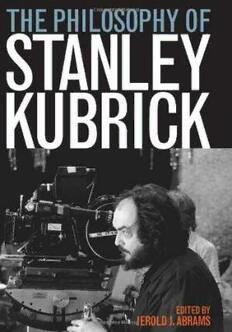
The Philosophy of Stanley Kubrick (The Philosophy of Popular Culture) PDF
Preview The Philosophy of Stanley Kubrick (The Philosophy of Popular Culture)
T P s K he hilosoPhy of Tanley ubricK The Philosophy of Popular Culture The books published in the Philosophy of Popular Culture series will illuminate and explore philosophical themes and ideas that occur in popular culture. The goal of this series is to demonstrate how philosophical inquiry has been reinvigo- rated by increased scholarly interest in the intersection of popular culture and philosophy, as well as to explore through philosophical analysis beloved modes of entertainment, such as movies, TV shows, and music. Philosophical con- cepts will be made accessible to the general reader through examples in popular culture. This series seeks to publish both established and emerging scholars who will engage a major area of popular culture for philosophical interpretation and examine the philosophical underpinnings of its themes. Eschewing ephemeral trends of philosophical and cultural theory, authors will establish and elaborate on connections between traditional philosophical ideas from important thinkers and the ever-expanding world of popular culture. Series Editor Mark T. Conard, Marymount Manhattan College, NY Books in the Series The Philosophy of Stanley Kubrick, edited by Jerold J. Abrams The Philosophy of Martin Scorsese, edited by Mark T. Conard The Philosophy of Neo-Noir, edited by Mark T. Conard Basketball and Philosophy, edited by Jerry L. Walls and Gregory Bassham The PhilosoPhy of s TA n l e y KubricK edited by Jerold J. Abrams T U P K he niversiTy ress of enTUcKy Publication of this volume was made possible in part by a grant from the National Endowment for the Humanities. Copyright © 2007 by The University Press of Kentucky Scholarly publisher for the Commonwealth, serving Bellarmine University, Berea College, Centre College of Kentucky, Eastern Kentucky University, The Filson Historical Society, Georgetown College, Kentucky Historical Society, Kentucky State University, Morehead State University, Murray State University, Northern Kentucky University, Transylvania University, University of Kentucky, University of Louisville, and Western Kentucky University. All rights reserved. Editorial and Sales Offices: The University Press of Kentucky 663 South Limestone Street, Lexington, Kentucky 40508-4008 www.kentuckypress.com 11 10 09 08 07 5 4 3 2 1 Library of Congress Cataloging-in-Publication Data The philosophy of Stanley Kubrick / edited by Jerold J. Abrams. p. cm. — (The philosophy of popular culture) Includes bibliographical references and index. ISBN 978-0-8131-2445-2 (hardcover : alk. paper) 1. Kubrick, Stanley—Criticism and interpretation. I. Abrams, Jerold J., 1971- PN1998.3.K83P55 2007 791.4302’33092—dc22 2007003153 This book is printed on acid-free recycled paper meeting the requirements of the American National Standard for Permanence in Paper for Printed Library Materials. Manufactured in the United States of America. Member of the Association of American University Presses Man stands face to face with the irrational. He feels within him his longing for happiness and for reason. The absurd is born of this confrontation between the human need and the unreasonable silence of the world. —Albert Camus, The Myth of Sisyphus and Other Essays This page intentionally left blank Contents Acknowledgments ix Introduction 1 Part One: The Subject at War Understanding the Enemy: The Dialogue of Fear in Fear and Desire and Dr. Strangelove 9 Elizabeth F. Cooke Chaos, Order, and Morality: Nietzsche’s Influence on Full Metal Jacket 33 Mark T. Conard Existential Ethics: Where the Paths of Glory Lead 49 Jason Holt Part Two: The Subject in Love Where the Rainbow Ends: Eyes Wide Shut 59 Karen D. Hoffman Knockout! Killer’s Kiss, the Somatic, and Kubrick 85 Kevin S. Decker The Logic of Lolita: Kubrick, Nabokov, and Poe 109 Jerold J. Abrams Part Three: The Subject and the Meaning of Life Rebel without a Cause: Stanley Kubrick and the Banality of the Good 133 Patrick Murray and Jeanne Schuler The Big Score: Fate, Morality, and Meaningful Life in The Killing 149 Steven M. Sanders Part Four: The Subject in History Spartacus and the Second Part of the Soul 167 Gordon Braden The Shape of Man: The Absurd and Barry Lyndon 183 Chris P. Pliatska The Shining and Anti-Nostalgia: Postmodern Notions of History 201 R. Barton Palmer Part Five: The Subject of the Future Nihilism and Freedom in the Films of Stanley Kubrick 221 Daniel Shaw “Please Make Me a Real Boy”: The Prayer of the Artificially Intelligent 235 Jason T. Eberl Nietzsche’s Overman as Posthuman Star Child in 2001: A Space Odyssey 247 Jerold J. Abrams Filmography 267 List of Contributors 269 Index 273 Acknowledgments First, I would like to thank all the contributors for their hard work and excellent essays. I would like to give special thanks to Mark Conard for his incredible editorial support and his continued philosophical dialogue. For editorial guidance and wisdom at every stage of the process, I am grateful to Steve Wrinn and Anne Dean Watkins at the University Press of Kentucky. Ron Mandelbaum at Photofest provided an excellent cover shot of Kubrick. Christopher Erisson provided valuable technical support. ElusiveDVD.com cleaned up and made available Kubrick’s once-lost first film Fear and Desire. I am also extremely grateful to Elizabeth F. Cooke and Chris Pliatska for many rich conversations on Kubrick, cinema, and philosophy in general. ix
